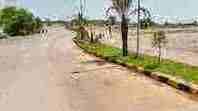Rawalpindi, commonly known as Pindi, is a city in the Punjab province of Pakistan. Rawalpindi is adjacent to Pakistan's capital of Islamabad, and the two are jointly known as the "twin cities" on account of strong social and economic links between the cities.
Rawalpindi is the fourth-largest city in Pakistan by population, while the larger Islamabad Metropolitan Area is the country's fifth-largest where kingdom valley Rawalpindi located.
Pakistan's economy is the 24th largest in the world in terms of purchasing power parity (PPP), and 43rd largest in terms of nominal gross domestic product. Pakistan has a population of over 207 million (the world's 6th-largest), giving it a nominal GDP per capita of $1,641 in 2019, which ranks 154th in the world and putting it just above the poverty line of $1,635.
On the human development index, Pakistan is ranked 145th out of 188 countries for 2019. This is among the lowest in the world, although it is improving. The economy of Pakistan is the 27th largest in the world in terms of purchasing power parity (PPP), and 47th largest in terms of nominal gross domestic product. Pakistan has a population of over 207 million (the world's 6th-largest), giving it a nominal GDP per capita of $1,641 in 2019, which ranks 154th in the world and just above the poverty line of $1,635.
The country is home to some of the oldest civilizations in history, including the Indus Valley Civilization. Pakistan's economy has historically been dependent on agriculture, but it is now diversifying into sectors such as textiles, pharmaceuticals, and tourism.
The economy of Rawalpindi is largely dependent on agriculture and tourism. The city is home to a number of historical and cultural attractions, which are significant contributors to the local economy.
The Rawalpindi Chamber of Commerce and Industry is one of the largest and most active chambers in Pakistan. It plays a pivotal role in promoting trade and investment in the city and the surrounding region.
The chamber organizes a number of
2. The Various Sectors of the Rawalpindi Economy
The economy of Rawalpindi is quite diversified and comprises numerous sectors. The city is home to a number of industries, including textile, electronics, pharmaceutical, food processing, and engineering. In addition, there is a growing service sector, which includes banking, finance, IT, and tourism.
The textile industry is one of the oldest and most important industries in Rawalpindi. The city is home to a number of textile mills, which produce a range of products, including fabric, yarn, and clothing. The electronics industry is another important sector of the Rawalpindi economy. The city is home to a number of electronics companies, which produce a range of products, including computers, mobile phones, and home appliances.
The pharmaceutical industry is also an important part of the Rawalpindi economy. The city is home to a number of pharmaceutical companies, which produce a range of products, including drugs, vaccines, and medical devices. The food processing industry is another important sector of the Rawalpindi economy. The city is home to a number of food processing companies, which produce a range of products, including flour, sugar, and oil.
The engineering sector is another important part of the Rawalpindi economy. The city is home to a number of engineering companies, which produce a range of products, including construction materials, machinery, and equipment. The service sector is also an important part of the Rawalpindi economy. The city is home to a number of service companies, which provide a range of services, including banking, finance, IT, and tourism.
3. The Contribution of the Rawalpindi Economy to the National Economy
The Rawalpindi economy is a significant contributor to the national economy of Pakistan. The city is home to a large number of industries and businesses, which provide employment to a large number of people. The city also houses a number of educational institutions, which produce a large number of skilled workers.
The industries in Rawalpindi include textiles, pharmaceuticals, electronics, and engineering. These industries provide employment to a large number of people. The city is also home to a number of business establishments, which provide services to the people living in the city.
The city also houses a number of educational institutions, which produce a large number of skilled workers. The graduates from these institutions are employed in various industries and business establishments in the city.
The city of Rawalpindi is a significant contributor to the national economy of Pakistan. The industries and businesses in the city provide employment to a large number of people. The educational institutions in the city produce a large number of skilled workers.
4. The Bright Future of the Rawalpindi Economy
Rawalpindi is the fourth largest city in Pakistan with a population of over three million. The city is located in the province of Punjab and is the capital of the country. Rawalpindi is a major commercial and industrial center and is home to many multinational corporations. The city has a large number of educational institutions and is a major center for medical tourism.
The economy of Rawalpindi is growing at a rapid pace and is expected to continue to grow in the coming years. The city has a large number of industries, including textiles, pharmaceuticals, electronics, and engineering. The city is also home to a number of multinational corporations. The economy of Rawalpindi is expected to grow at a rate of 7.5% in the next five years.
The government is investing heavily in the economy of Rawalpindi and is working to improve the infrastructure of the city. The government is also working to attract foreign investors to the city. Rawalpindi is an important city for the economy of Pakistan and is expected to play a major role in the country's economic growth in the coming years.
